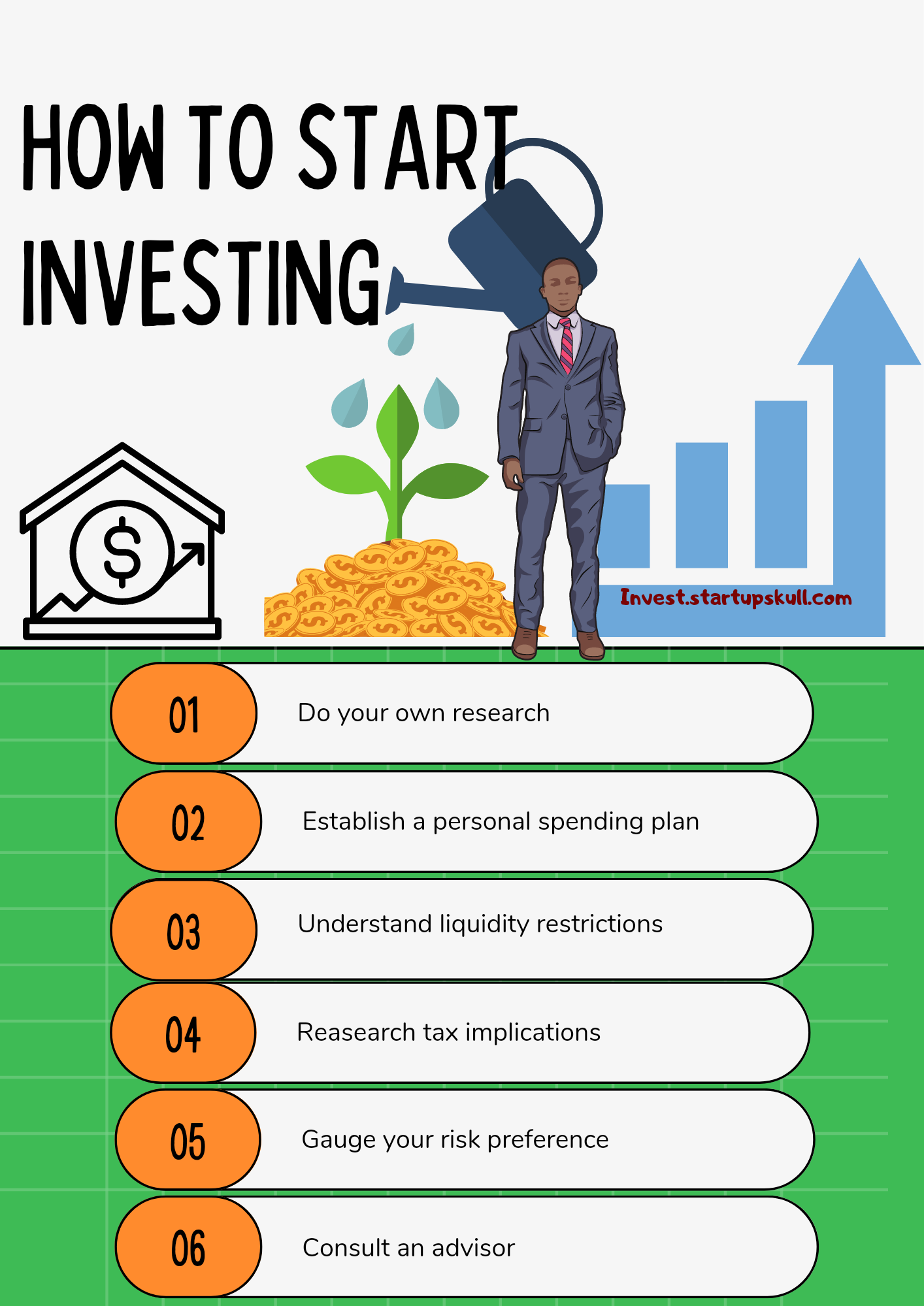
There are many different avenues one can take when learning how to invest or where to start when putting money aside. Here are some tips for getting started in investing: –
- Do your own research. A common phrase used in investing industry; it is important for investors to understand the vehicle they are putting their money into. Weather it is a single share of a well-established company or a risky alternative investment endeavor, investor should do their homework in advance as opposed to relying on third- party (and often biased) advise.
- Establish a personal spending plan:- Before investing, individual should consider their ability toto put money away. This include ensuring they have enough capital to pay monthly expense and have already built up an emergency fund. As enticing as investing can be, individual should be mindful to meet their daily life obligations first.
- Understand liquidity restrictions. Some investors may be less liquid than others, meaning it may be more difficult to sell. In some cases, an investment may be locked for a certain period and can not be liquidated. Though not necessary fine print, its important to understand whether certain investments can be bought or sold at any time.
- Research Tax implications. On a similar note, though an investment can be bought or sold at any time, it may be tax adverse to do so. With unfavorable short-term capital gains tax rate, investors should be mindful to strategies that extent beyond what product they hold but what tax vehicle they put the investment in.
- Gauge your risk preference:- As mentioned earlier, investing incurs risk. This means you may end up with less money than what you started with. Investors uncomfortable with this idea can (1) reduce the amount they invest to only what they are comfortable losing (2) explore ways to mitigate risk.
- Consult an adviser:- Many financial professionals would be happy to provide their guidance let you know what they think about market , and give you access to online platforms where you can invest money.
Return on investment.
The primary way to gauge the success of investment is to calculate the return on investment (ROI) is measured as:
ROI = ( Current value of investment- Original value of investment)/ Original value of investment
ROI allows different investments across different industry to be appropriately compared . For example, consider two investment: a $1000 investment in stocks that increase to $1100 over the past years, or a $150,000 investment in real state that now worth $160,000.
Stock ROI= ($1,100-$1,000)/$1,000= $100 /$1,000=10%
Real Estate ROI= ($160,000-$150,000)/$150,000=$10,000/$150,000=6.67%
Though the real estate investment has increased in value $10,000, many would claim that the stock investment has outperformed the real estate investment. This is because every dollar invested in real estate.
Investment and Risk
In its simplest form, investment return and risk should have a positive correlation. If an investment is safer, it will often have lower returns.
When making investment decisions, investors must gauge their risk appetite. Every investor will be different, as some may be willing to risk the loss of principal in exchange for the chance at greater profits. Alternatively, extremely risk- adverse investors seek only the safest vehicles where their investment will only consistently (but slowly grow).
Investment and diversification.
One-way investors can reduce portfolio risk is to have a broad range of what they are invested in. By holding different productor securities, an investor may not lose as much money as they are not fully exposed in any one way.
The concept of Diversification was born from modern portfolio theory, the idea that holding both equities and will positively impact the risk- adjusted rate of return In a portfolio. The argument is holding strictly equities may maximize volatility. Paring it with a more stable investment with lower return will decrease the risk of investor incurs.
Investing vs Speculation
Speculation is a distinct activity from investing. Investment involves the purchase of assets with the intent of holding them for the long term, while speculation involve attempting to capitalize on market efficiency for short term profit. Ownership is generally not a goal of speculators, while investors often look the no. of assets in their portfolio over time.
Although speculators are often making informed decision, speculation cannot usually be categorized as traditional investing. Speculation is generally considered a higher risk activity then traditional investing. Speculation is generally considered a higher risk activity than traditional investing . Some experts compare speculation with gambling, but the veracity of this analogy may be matter of personal opinion.
Investment vs. Saving
Saving is accumulating money for future use and entails no risk, where as investment is the act of leveraging money for a potential future gain and its entail some risk. Though both have the intention of having more capital available in the future , each grow about growing in very different way.
One aspect this is more transparent is the process of saving for a down payment on a home. many advisors will suggest parking cash in a safer investment vehicle when saving for an important major purchase. Because investing incurs a higher degree of risk, an individual must compare what implications of loss of principal would be to their future plans.
Investment vs. Bet or gamble
In an investment, you are providing some individual or entity with funds to be put to work growing a business, starting new project, Or maintaining day to day revenue generation. Investment, while they can be risky have a positive expected return.
Gambles on the other hand based on chance not putting the money into work they are highly risky and also have negative expected return in most case